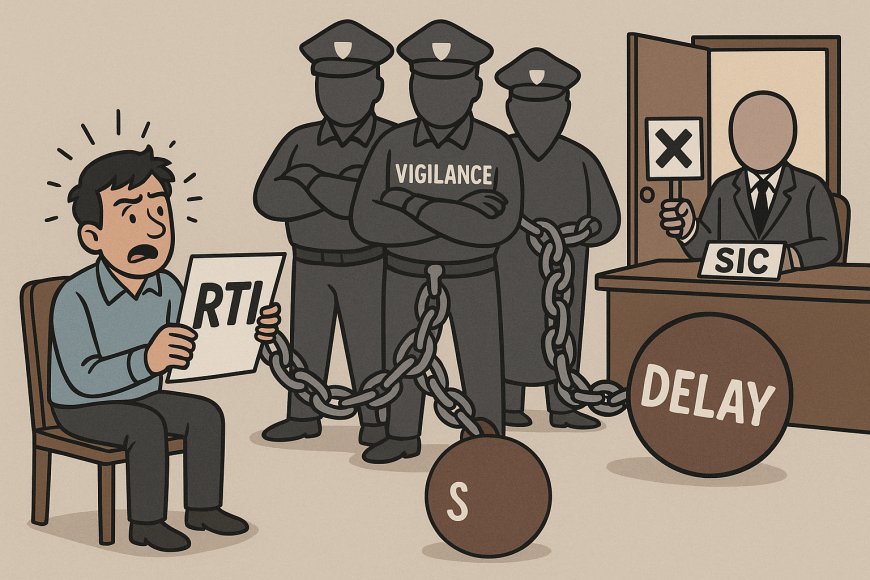Transparency Under Scrutiny: Allegations Against Uttarakhand Oversight Bodies
Uttarakhand Vigilance Department of deliberately delaying information and withholding procedures. He also raised conflict of interest concerns regarding CIC at the Uttarakhand State Information Commission, leading to his case being transferred to Commissioner Yogesh Bhatt.

Introduction: A Challenge to Accountability
Serious allegations have been brought forth challenging the operational transparency and procedural integrity of key state institutions in Uttarakhand. A complaint targets the Uttarakhand Vigilance Department (specifically its Haldwani Sector, Dehradun Sector, and Headquarters) and extends deep criticisms towards the Uttarakhand State Information Commission (Suchna Ayog). It is contended that these bodies, far from upholding the principles of the Right to Information (RTI) Act, 2005, are engaging in practices designed to obstruct access to information, foster delays, and potentially shield internal operations from public scrutiny. This situation presents a critical test case for democratic accountability mechanisms within the state.
In-Depth Allegations: Systematic Evasion Alleged Against Uttarakhand Vigilance Department
At the heart of the complaint lies the accusation of systematic harassment and deliberate obfuscation by the Uttarakhand Vigilance Department. The complaint details a pattern where RTI applications seeking information are allegedly subjected to bureaucratic shuffling, being repeatedly forwarded between the Vigilance Sector Haldwani, Vigilance Sector Dehradun, and the Vigilance Headquarters Dehradun. It is argued this administrative carousel serves no legitimate purpose other than to manufacture delays and frustrate the information-seeking process, thereby undermining the time-bound disclosure mandated by the RTI Act.
The core of this specific dispute appears to revolve around access to the Standard Operating Procedures (SOPs) governing the Vigilance Department's functioning. During proceedings before the Uttarakhand State Information Commission, it was highlighted that the Public Information Officer (PIO) representing the Vigilance Department deliberately withheld these crucial SOPs. The justifications offered for this non-disclosure were described as dubious and lacking legal standing, representing a clear attempt to operate under a veil of secrecy. This refusal strikes at the fundamental premise of the RTI Act, which empowers citizens to understand the processes and protocols governing public authorities. Critically, denying access to SOPs prevents any meaningful public assessment of whether the Vigilance Department adheres to its own procedural guidelines, raising deep questions about its accountability and consistency in its operations.
Conflict of Interest Concerns and Procedural Integrity at the Uttarakhand State Information Commission
The controversy intensifies with pointed concerns raised regarding potential conflicts of interest and procedural fairness within the Uttarakhand State Information Commission (Suchna Ayog) itself. Concerns were specifically raised about the appropriateness of former Additional Chief Secretary Radha Raturi being involved in handling vigilance-related matters or rosters within the Commission. Her previous senior roles within the Uttarakhand government, including positions closely associated with Personnel and Vigilance functions, were highlighted.
It was argued that assigning oversight responsibilities concerning the Vigilance Department to an individual with such a background inherently compromises the impartiality expected of the Commission. The concern was expressed that "Such a glaring conflict undermines public trust." This situation raises critical questions about the Commission's internal mechanisms for identifying and managing potential conflicts of interest.
Bench Transfer: Addressing Conflict or Symptom of Deeper Issues?
Further procedural concerns arose regarding the handling of the appeal. Initially, strong reservations were expressed about the bench assignment due to the potential conflict involving Radha Raturi. As documented in the Commission's own proceedings, a formal request was made that the case be transferred to a different bench precisely because of Radha Raturi's prior association with the Personnel and Vigilance departments of the Uttarakhand Government.
The Commission, acknowledging the legal validity ("vidhisammat paate hue") of the concern raised, subsequently ordered the transfer of the second appeal to the bench presided over by State Information Commissioner Shri Yogesh Bhatt. While this transfer addresses the immediate conflict highlighted by the appellant, it critically points to a potential lapse in the Commission's initial case allocation process. The necessity for such a transfer begs the question: why was a case involving the Vigilance Department potentially assigned in a manner that could create an apparent conflict of interest in the first place? This incident underscores the need for robust, transparent protocols for case assignment within the Commission.
Broader Critique: The Erosion of RTI Principles and Call for Reform
This case transcends an individual grievance; it exemplifies broader anxieties about the state of transparency and accountability in Uttarakhand. It paints a picture where institutions designated as pillars of oversight – the Vigilance Department and the State Information Commission – are themselves accused of employing tactics that undermine the public's fundamental right to know. The alleged bureaucratic stonewalling, the questionable withholding of procedural documents, and the emergence of potential conflicts of interest collectively challenge the narrative that these institutions are infallible champions of probity.
Such institutional behaviour suggests a potential disregard for the spirit of the RTI Act, 2005, and the principles of natural justice. The call for civil society and media organizations to closely monitor these developments is a necessary invocation for public vigilance to safeguard democratic norms. Immediate reforms focusing on stricter adherence to RTI timelines, transparent justification for information denial, and rigorous conflict-of-interest protocols within the State Information Commission seem imperative.
Conclusion: Awaiting the Next Hearing with Critical Scrutiny
The next hearing in the appeal is scheduled before State Information Commissioner Yogesh Bhatt on May 30, 2025. This hearing will be closely watched. Will it mark a turn towards genuine adherence to the principles of transparency and natural justice, compelling the Vigilance Department to be forthcoming? Or will it demonstrate the persistence of institutional inertia and defensiveness? The outcome will resonate beyond this single case, indicating the Uttarakhand State Information Commission's commitment to vigorously defending the citizen's right to information against potential bureaucratic or institutional resistance.
(Note: The original text mentions a copy of the information commission's order is available for download.)
Files
What's Your Reaction?
 Like
0
Like
0
 Dislike
0
Dislike
0
 Love
0
Love
0
 Funny
0
Funny
0
 Angry
0
Angry
0
 Sad
0
Sad
0
 Wow
0
Wow
0







































